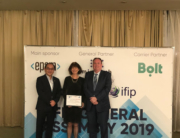By Raimundo José de Araújo Macêdo & Marcelo Rita Pias
In response to a call from the United Nations, which in its Sustainable Development Goal number 13 establishes urgent measures to combat climate change and its impacts on society, the International Federation for Information Processing (IFIP) has created a new Task Force to identify the main challenges and opportunities of using digital technologies to combat climate change and its impacts. SBC (The Brazilian Computer Society) was invited to lead this Task Force, among other reasons, due to the publication of the Manifesto entitled “Digital Technologies for the Environment”, approved at the SBC General Assembly in August 2022. This article describes the motivations and objectives of this Task Force. Motivations
The United Nations Sustainable Development Goals (SDGs) set out the vision of protecting the environment and climate, in pursuit of peace and prosperity for all. In particular, SDG 13 calls for urgent action to tackle climate change and its impacts on society.
The United Nations Climate Change Conference (COP 27) reaffirms the commitments made, creating a framework of concrete targets to tackle climate change, with the ambitious goal of limiting the increase in the Earth’s average temperature to no more than 1.5°C compared to the pre-industrial period. Digital or computer technologies are strong allies for the fulfillment of such commitments.
To this end, the integrated development of technologies that enable more efficient processes to collect, organize and share information on different aspects of life on the planet is key. Digital technologies such as digital twins, AI, cyber-physical systems, Internet of Things (IoT), among others, enable high-precision digital models to support environmental management. For example, the Destination Earth initiative in Europe aims to create a high-precision digital model of the Earth, offering a collaboration platform to promote good practices and information sharing in support of environmental public policies (Destination Earth, 2021).
Founded in 1960 under the auspices of the United Nations Educational, Scientific and Cultural Organization (UNESCO), the International Federation for Information Processing (IFIP) integrates national Information and Communication Technology (ICT) societies. Given its global nature and adherence to the ideals of the United Nations, IFIP offers an enabling environment for integrative actions at the planetary level.
Over the decades, SBC has played an active role in several initiatives promoted by the federation. Its involvement ranges from participation in technical committees, working groups and scientific conferences, to the overall organization of the federation (SBC Activity Report for the IFIP Meeting, 2022). Among these activities, SBC is leading a newly created Task Force to address the challenges and opportunities of digital technologies to combat climate change and its impacts (IFIP Moves on Climate Change, 2023). SBC’s involvement in this Task Force is justified and motivated by the launch of the Manifesto entitled “Digital Technologies for the Environment”, approved at the SBC General Assembly in August 2022 (SBC Annual Congress, 2022).
The new task force will benefit from several traditional IFIP actions. In particular, IFIP Technical Committee TC09 aims to address the relationship between ICT and society; thus, its concerns include many climate change issues. Specifically, TC09 Working Group WG 9.9 addresses ICT and sustainable development. In addition to TC09, working groups of other technical committees also address enabling technologies or specific knowledge with the potential to be applied in the development of systems and solutions to address climate change.
We can mention some of these committees, such as:
- TC12 – Artificial Intelligence;
- TC10 – Computing Systems Technologies;
- TC06 – Communications; TC05 – Information Technology Applications;
- TC07 – Systems Modeling and Optimization;
- TC08 – Information Systems; and
- TC02 – Software: Theory and Practice; among others.
A good example is the working group WG 12.11 that deals specifically with AI for Energy and Sustainability. Finally, TC03 – Education, plays a key role in discussing these sustainable technology issues in education systems around the world.
Objectives of the Task Force The overall objective of the Task Force is to identify challenges and opportunities of using digital technologies to combat climate change and its impacts, including technical recommendations and activities for global community engagement, relevant projects and events.
The Task Force will engage with IFIP national scientific societies, technical committees and working groups in order to: – identify the scope of work to be achieved, including specific climate change challenges, opportunities and potential digital technologies that can be used to address these challenges; – propose recommendations covering technical solutions, human capacity building and mainstreaming efforts; – identify the impacts of the manufacture, consumption and disposal of digital technologies on climate change and propose global actions that minimize such impacts; – conduct outreach activities for the engagement of the global community, including relevant projects and events; and, – promote open science practices in initiatives and projects in the area.
Members of the Task Force:
- Raimundo J de A Macêdo, SBC and Task Force Chair;
- David Cook, Vice President, Australian Computer Society;
- David Kreps, National University of Ireland, IFIP TC09 Chair;
- Gülgün Kayakutlu, Istanbul Technical University, IFIP WG12. 11 Chair;
- Liwan Liyanage, School of Computing, Data and Mathematical Sciences, Western Sydney University, Australia;
- John Higgins, Immediate Past President of the British Computer Society;
- Marcelo Pias, Computer Science Center, Federal University of Rio Grande (FURG). Secretary General of the Task Force;
- Otthein Herzog, University of Bremen, Germany;
- Yuko Murayama, Institute of Mathematics and Computer Science, Tsuda University, Japan. Past chair IFIP WG 5.15 – Information Technology in Disaster Risk Reduction.
The Task Force has been planned in three main activities: a scoping exercise, considering that the space to be explored is very diverse; establishing technical recommendations, such as solutions based on digital technologies and capacity building; and finally, promoting projects in key application areas, such as in circular economy. The Task Force aims to complete its work in one year and is currently at the end of the scoping phase. In the course of the scoping phase discussions, Task Force members identified common themes, including system and data standards, digital twins, events, guidelines, policies and disaster management. In order to gain a broader perspective from IFIP stakeholders, which include technical committees and federation member societies, the Task Force developed a brief questionnaire addressing the convergence between digital technology and climate change challenges. The answers collected through this questionnaire will help in the elaboration of the document that will mark the closure of the scoping phase, scheduled for June 2023. The finalization of the Task Force’s work is scheduled for February 2024.
References:
- IFIP Moves on Climate Change, IFIPnews, January 2023. Available at: <https://www.ifipnews.org/ifip-moves-on-climatechange/>. Accessed on: 15/03/2023.
- Digital Technologies for the Environment: SBC Manifesto, August 2022. Available at: <https://sol.sbc.org.br/livros/index. php/sbc/catalog/book/104>. Accessed on: 15/03/2022.
- SBC Annual Congress, Niterói, August 2022. Video of the assembly available at: <https://www.youtube.com/live/oqG3NV1sEM?feature=share>. Accessed on: 15/03/2023.
- Destination Earth, January 2021. Available at: <https://digital-strategy.ec.europa.eu/en/policies/destination-earth>. Accessed on: 15/03/2023.
- SBC Activity Report for the Period August 2021 to July 2022 for the IFIP Meeting. September, 2022. Available at: <https://sol.sbc.org.br/livros/index.php/sbc/catalog/book/115>. Accessed on: 15/03/2023.
 RAIMUNDO JOSÉ DE ARAÚJO MACÊDO is Full Professor at the DCI/IC of the Federal University of Bahia (UFBA). President of SBC, elected in 2019 (biennium 2019-2021), re-elected in 2021 (biennium 2021-2023). Graduated from UFBA (1982), Master’s degree from the State University of Campinas – Unicamp (1986) and PhD from the University of Newcastle Upon Tyne, England (1994). Founder, in 1995, and current coordinator, of the Distributed Systems Laboratory (LaSiD/UFBA). He was proponent and coordinator of three postgraduate programs at UFBA: Distributed Systems, Computer Science and Mechatronics. Visiting researcher at IRISA/France (1997, 2000, 2002 and 2011) and at the University of Lisbon/Portugal (2008). Elected member of the IFIP (International Federation for Information Processing) board from 2015 to 2021 and of the CLEI (Centro Latinoamericano de Estudios en Informática) steering committee from 2011 to 2016. Member of the Matrix University Council and Pro-Rector of Information and Communication Technologies of the Federal University of Southern Bahia from 2013 to 2017.
RAIMUNDO JOSÉ DE ARAÚJO MACÊDO is Full Professor at the DCI/IC of the Federal University of Bahia (UFBA). President of SBC, elected in 2019 (biennium 2019-2021), re-elected in 2021 (biennium 2021-2023). Graduated from UFBA (1982), Master’s degree from the State University of Campinas – Unicamp (1986) and PhD from the University of Newcastle Upon Tyne, England (1994). Founder, in 1995, and current coordinator, of the Distributed Systems Laboratory (LaSiD/UFBA). He was proponent and coordinator of three postgraduate programs at UFBA: Distributed Systems, Computer Science and Mechatronics. Visiting researcher at IRISA/France (1997, 2000, 2002 and 2011) and at the University of Lisbon/Portugal (2008). Elected member of the IFIP (International Federation for Information Processing) board from 2015 to 2021 and of the CLEI (Centro Latinoamericano de Estudios en Informática) steering committee from 2011 to 2016. Member of the Matrix University Council and Pro-Rector of Information and Communication Technologies of the Federal University of Southern Bahia from 2013 to 2017.
 MARCELO RITA PIAS is Adjunct Professor at the Center for Computational Sciences (C3) of the Federal University of Rio Grande (FURG). He obtained a PhD in Computer Science from University College London (UCL), UK, where he subsequently worked as a researcher in the Department of Computing at the University of Cambridge. This work was complemented with an industrial post-doc internship at INTEL Research Labs. His research interests are in the areas of smart sensors, embedded A.I. and distributed systems.
MARCELO RITA PIAS is Adjunct Professor at the Center for Computational Sciences (C3) of the Federal University of Rio Grande (FURG). He obtained a PhD in Computer Science from University College London (UCL), UK, where he subsequently worked as a researcher in the Department of Computing at the University of Cambridge. This work was complemented with an industrial post-doc internship at INTEL Research Labs. His research interests are in the areas of smart sensors, embedded A.I. and distributed systems.
This article was first published in the July issue of CB Brasil, the official publication of the Brazilian Computer Society.





